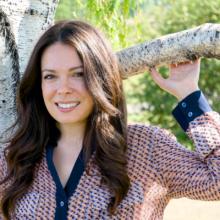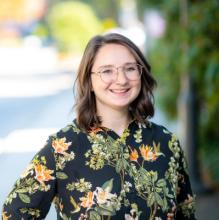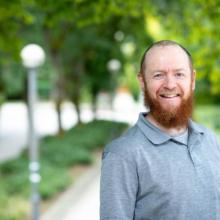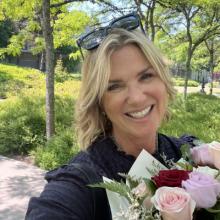Kirsten McIlveen has been going into the women's prisons for about 25 years. It all started when she became involved with Joint Effort, a group that has been supporting folks at women's prisons since the 1970s. “I became really connected with this work. It just drew me in,” she said. “I would say that everything that I learned about feminism has come from the community of prisoners inside women's prisons.”
Then in 2015, Kirsten, who is an instructor at Capilano University, was invited to organize classes at Fraser Valley Institution (FVI), the Federal Women's Prison. It started with just her and another colleague, but soon she began to invite other faculty members to teach one-off classes. “In a way, it’s trying to connect the outside community with the prisoner community because that's one way of breaking down isolation.”
Today Kirsten is pursuing a PhD in Geography at UBC, with the goal of exploring the possibilities for postsecondary education to exist in a carceral environment. She wants to get university credit courses more formally implemented in prison. “I came across a program called Walls to Bridges, Walls to Bridges Canada where nine universities are involved in various prisons in Ontario. My goal has been to get Walls to Bridges to be implemented at the Federal Women's Prison here, at least as a start.”
According to her, UBC is interested as is Capilano University as it aligns nicely with key institutional priorities (experiential learning and decolonizing the academy). Now it's just a matter of working out the funding details from the university. She hopes to offer the first course in the fall of 2019 through Capilano University’s Geography department, with eight university students and eight inside-prison students, working together as peers and equals.
“It's not the kind of the top-down model. It's really asking students to bring in their lived experiences and connect these with the theories and the concepts that we unpack [in class].” She’s currently trying to secure funding for the in-prison students through a crowdfunding campaign.
At the core of her research, Kirsten wants to bridge the gap between academics with prisoners. She believes getting a university credit can help improve one’s self-esteem. But more than that, research shows that education in the prison setting can help reduce recidivism rates and isolation of prisoners, as well as address the over incarceration of Indigenous folks.
“It creates new ways of thinking, new vocabulary, new connections with the outside community. Importantly, it gives prisoners tools to deconstruct their imprisonment, to deconstruct the bigger structural inequities that might have led them there. There's just so much potential that this work has,” she concluded.
Research Description
My proposed research takes up the concern of more fully understanding the possibilities of and impediments to extending post-secondary education to women prisoners in Canada. Under Dr. Geraldine Pratt in the UBC Department of Geography, I am pursuing a PhD focused on carceral geography: a geographical perspective on spaces and practices of incarceration. In particular I will focus on the tension between punishment and education which creates the paradox of post-secondary education in women’s prisons: higher education promotes critical thinking and questioning while the prison protocol requires compliance and punishes women when they question authority. During the period for which I will hold the scholarship I will be investigating models of post-secondary education in federal women’s prisons in Canada. The PSI funding will, in the first instance, fund weekly trips to Fraser Valley Institution, which is my primary site of investigation and innovation and is where I have enduring contact with medium security women prisoners. This is the institution where I have initiated educational programming. Trips to women’s prisons in Ontario and Manitoba will allow me to study firsthand the post-secondary programming that has been set up there.
What does being a Public Scholar mean to you?
Being a Public Scholar means that I am able to work at the intersection of community-based research/practice and academia. Being a Public Scholar means being able to ‘fold’ my research in to community work that I have been engaged in for a very long time; it allows me to centre imprisoned women and to take a critical, ethical approach to the research itself and work within the context of unceded territories and connecting with the groundwork that has been laid for decades, generations and millennia.
In what ways do you think the PhD experience can be re-imagined with the Public Scholars Initiative?
Working within the Public Scholars framework allows for a feminist, anti/non-colonial perspective to inform this work and which can benefit the community and not simply be one of extraction. Post-secondary education can be a means to transcend both physical and psycho-social limits that prison imposes. Significantly, for prison students, it can and should lead to a deeper questioning of the very structures and assumptions that leads to an emphasis on punishment over rehabilitation. In this way, PhDs can push boundaries and limits of what a PhD experience should be.
How do you envision connecting your PhD work with broader career possibilities?
I hope to contribute to the advancement of academic knowledge; I hope that Corrections Canada will consider opportunities for federal (and provincial) prisoners to have access to post-secondary education and to connect the academic community with those on the margins.
How does your research engage with the larger community and social partners?
This work engages the larger community in surprising ways and creates possibilities to engage academics and community groups with marginalized populations. Spaces of prison and of education do not necessarily overlap; the prison and the university operate at the bottom and top of the social hierarchy, respectively, and opportunities for engagement are often constrained by spatial, economic, gender and racialized structures of power. Yet, these institutions are beginning to intersect in surprising ways, in which spaces of education operate within the spaces of the prison.
Why did you decide to pursue a graduate degree?
My graduate degree builds on my activism within the prison abolition movement. This recent education outreach is the continuance and deepening of long-term relationships that I have formed with federally sentenced women; these in turn have immeasurably informed my personal and academic trajectories. In order that the university and the prison begin to intersect, it was important for me to return to university to obtain my degree in order to find ways to provide prisoner access to university courses.
Why did you choose to come to British Columbia and study at UBC?
UBC Geography is one of the few geography departments in North America that has faculty (ie my advisor, Dr Gerry Pratt) with interest and expertise in the new sub-disciplinary field of carceral geography; it is to this sub-discipline that I can bring a wealth of first-hand experience and knowledge. UBC is also engaged in new explorations in higher educational delivery, some of which may accelerate opportunities for post-secondary educational attainment among imprisoned women.
Being a Public Scholar means that I am able to work at the intersection of community-based research/practice and academia. Being a Public Scholar means being able to ‘fold’ my research in to community work that I have been engaged in for a very long time.




